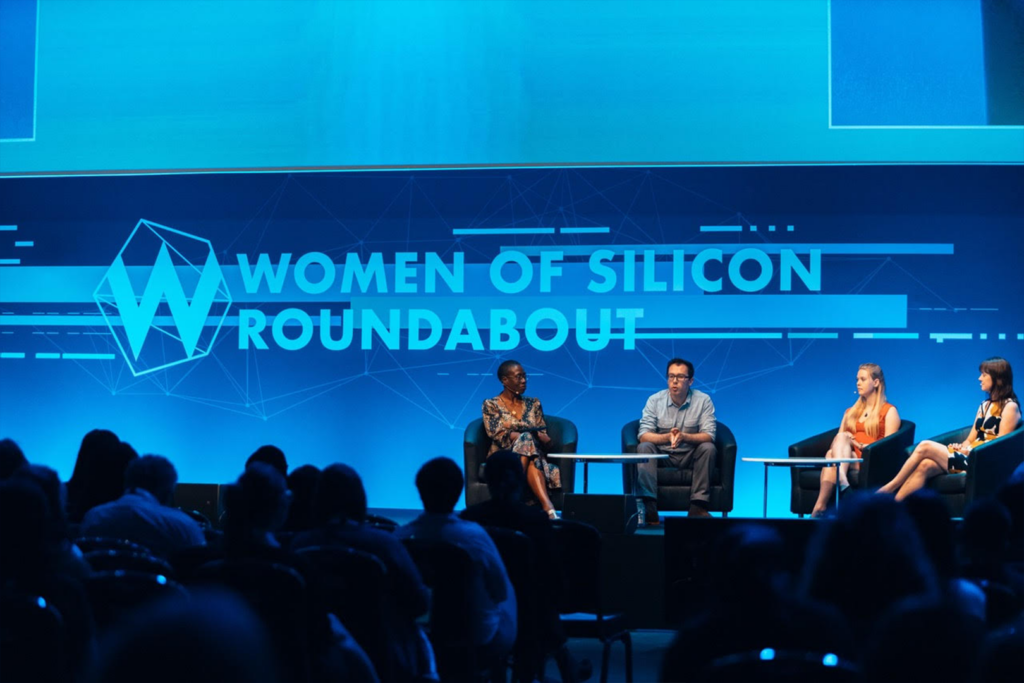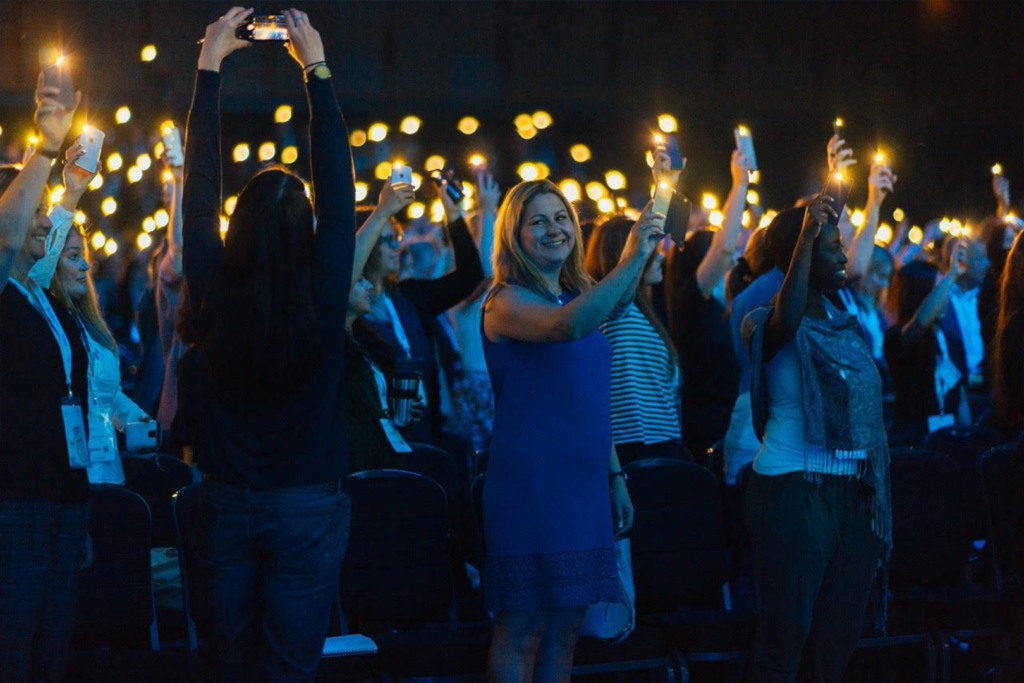
Michaela Jeffery-Morrison is a self-professed organiser. “To organise stuff has always been a passion of mine. Whether it’s my life, my mum, my work – it seems quite natural for me.”
Back in 2015, Jeffery-Morrison – then aged just 25 – was organised enough to kickstart her very own business. And not just any business, but one tailored to her specific set of managerial skills: an events company. Maddox Events, co-founded with brothers Patrick and Freddie Lewis, was born.
Five years on and Maddox Events has made a sizeable impression on the technology industry, an impact even the ambitious Jeffery-Morrison and her colleagues wouldn’t have foreseen. Their team is the driving force behind the popular Women In Tech World Series events, including the flagship Women of Silicon Roundabout – a conference due to attract around 8,000 visitors when it takes over London ExCel later this year.
Championing the role of women in technology, and encouraging greater sector diversity as a whole, were the founding principles of Maddox Events and remain the core values of this fast-growing business today. Jeffery-Morrison, who now holds the joint role of COO and Head of Production, picks up the story.
“We wanted to create events that championed diversity in all its forms while pushing forward the idea that we were not just looking at diversity but personal development and networking opportunities, all the time getting involved with some of the most progressive and impressive companies in the world,” she explains to Digital Bulletin.
“We definitely didn’t know where we were going with it [from an industry perspective], but tech just kept coming up. I wasn’t a woman in technology so I wasn’t aware of it, but it was never pushed to me as an opportunity – so it piqued my interest. I explored it and saw that there was no-one doing what we could potentially do, and we started from there.”
It is a bare fact that the technology sector faces an enormous problem with gender diversity. Women are chronically underrepresented both in technical roles and on the C-suites of the tech organisations taking the business world by storm. A recent McKinsey study found that only 26% of the computing workforce in the United States were female, and women accounted for just 11% of the leadership teams in technology companies.
No one force can itself tackle the societal, cultural and institutional issues behind such damning statistics, but in a time where gains are finally being made around awareness and change programme delivery, Maddox Events can claim to be at the forefront in the UK and Europe.
“When we first started there was nothing out there like it so it was a breath of fresh air for a lot of people,” says Jeffery-Morrison. “There was no forum where people could come together and see people like themselves. When you are part of that, you only want to go more and more. Our first event was 300 people; then we doubled that, then we tripled it, then we quadrupled it.”
Maddox claims the Women of Silicon Roundabout event has grown into Europe’s “biggest celebration” of the successes and innovations pioneered by women in technology. This year’s conference will host more than 200 speakers, including female leaders from the likes of Microsoft, IBM and HPE, with over 12,000 workshop spaces alongside tracks and seminars touching on the all-important industry topics.
Tech just kept coming up. I wasn’t a woman in technology so I wasn’t aware of it, but it was never pushed to me as an opportunity - so it piqued my interest. I explored it and saw that there was no-one doing what we could potentially do, and we started from there
Through taking this show on the road, the Women in Tech World Series has spawned and additional events are now hosted in Cape Town, San Francisco, Amsterdam, Boston and Dublin. According to Jeffery-Morrison, the rapid growth of Maddox’s portfolio can be put down to its laser focus on the twin priorities of content and networking – and the progressive nature of its event agendas.
“Initially I was reaching out to people who said they didn’t want to be part of an event that was moaning about the situation,” she reveals. “It’s not about moaning about the situation; it’s about coming together and looking at solutions, and celebrating the success of women in tech.
“Once word of mouth got out, we kept listening to what our community wanted and we kept providing the right content. I think, in terms of attracting lots of different people, it’s because we cater to different people too.
“You can jump into an inspiring main stage talk with 8,000 people around you to listen to a woman from the C-suite on how she went from secretary to CIO. Then you can jump out of there and go into a workshop on Python, and it’s a masterclass, and you can sit down with likeminded people and create some code. Then you go away from there and go into a workshop that tells you how to be a successful remote employee – it’s a one-stop shop for everything.”
The rate of expansion for Maddox’s events and the anecdotal evidence offered up by Jeffery-Morrison – “it’s almost weird to see everybody happy and smiling at a B2B conference” – points to a movement that is fast gathering momentum. But what are the ultimate barriers it is trying to break down?
Jeffery-Morrison is adamant that far more can be achieved in making minority groups aware of the opportunities available in an exploding technology sector.
“When you think of tech, you think of coders, people who can code websites only, and that’s completely wrong because you don’t have to be good at technology to be in tech, there are so many other options available to you. There’s an incredible lack of awareness,” she says.
“It led me to then push deeper into the reasons why and it’s got a lot to do with statistics, it’s got a lot to do with what’s actually out there compared to the stereotype of someone who works in technology. Every big company has a massive tech department now, but that’s also why the numbers are bad – because tech is in every company and you can’t hide from it, and the dominant sex is male.”

The burden of responsibility broadly falls on the shoulders of those companies in point, and a number have worked directly with Maddox Events to show their support for its diversity campaigning, including Facebook, Microsoft and Amazon.
Another collaborator, Google, publishes its own diversity report every year but the most recent version showed only small signs of progress. The percentage of female hires at the Silicon Valley giant increased slightly from 31.3% in 2017 to 33.2% in 2018 but diversity actually declined in its “organisational leadership”.
Jeffery-Morrison admits the change that’s required is going to take a significant amount of time, and she believes that every business must evolve diversity strategies in their own way with a “one-size fits all” approach impossible to action.
“Every company will be in a different place; they’re going to have different numbers of employees, different people at the helm – it’s really important to be aware of that,” adds the Maddox co-founder. “When you’re looking at taking steps to create a more diverse and more inclusive workforce, you have to strip the company back strategically and work out where these initiatives, networks and hiring strategies come in.
“It takes time to hire the right people. When you think of that, and you look at a 150-year-old company with 200,000 employees, the change is going to be very, very slow. It’s about moving away from the idea that change is going to happen quickly, because it’s just not. When you’re educating people and creating awareness, it takes a long time.”
What does change look like for Maddox Events in 2020 and beyond? It plans to take the Women in Tech World Series to more parts of the globe while at the same time striving to fight an even wider range of diversity challenges through richer, content-heavy events and conferences.
“In 2019, we put on lots of events and hired a lot of people but we spread ourselves quite thinly, to be honest with you,” says Jeffery-Morrison. “In 2020, we want to grow our community by giving them more content and we also want to broaden our event offering. We need to make sure people understand that even though this event will always be called “Women In” or “Women of”, diversity in tech is more than just gender.
“We’re looking at building out more features as well: hackathons, pre-event days – basically building things around the event and establishing ourselves as the leaders. When people think of fizzy drinks, they think of Coca Cola. What we’re really trying to get to here is the point when people think of D&I (diversity and inclusion) and events, they think of Maddox Events.”


